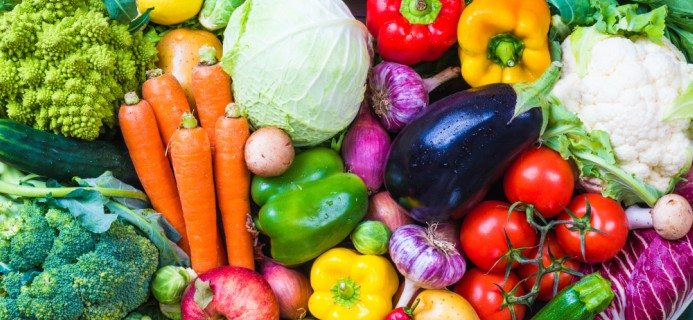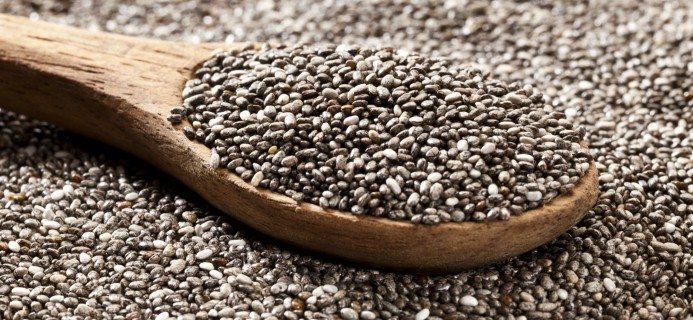Want more energy? Tired all the time? It could be that you need to eat to support your thyroid gland, says our No-Nonsense nutritionist May Simpkin
One of the most common complaints I come across with clients is fatigue and feeling tired all the time for now reason. They often reach me after frustrating and often fruitless attempts to delve deeper into what to eat and what to avoid, to restore their energy levels and repeated tests through the NHS or privately, have confirmed a diagnosis of an underperforming thyroid gland. Supporting the thyroid, alongside medical intervention if necessary, is important.

The butterfly-shaped thyroid gland is located around your windpipe in the neck and is crucial to your overall health. Its role is to produce hormones that are released into the blood stream which regulate your metabolism; controlling most of the functions in your body. It is important to consider that all hormones work synergistically together and one imbalance easily impacts others. For example, a thyroid imbalance can affect the adrenal glands and the production of the stress hormone cortisol and the production of sex hormones such as oestrogen, progesterone and testosterone.
The butterfly-shaped thyroid gland is located around your windpipe in the neck and is crucial to your overall health.
If thyroid hormones are not being produced in the right quantities or not being converted efficiently into their active forms, you will be susceptible to the effects of thyroid dysfunction – and being tired is top of that list. An underactive thyroid is either caused by an underlying autoimmune condition, where the body’s immune system attacks other tissues in the body or in this case the thyroid gland. It can be due to a damaged thyroid, for example; as a result of whiplash or injury to the neck area.
With an underactive thyroid, the thyroid gland is not producing enough thyroid hormone for your body’s needs. It is the opposite case with a hyperactive thyroid.
There are many symptoms associated with each condition, so here’s a list to help you.
THYROID DISORDER SYMPTOMS
HYPOTHYROIDISM (Hashimoto’s Disease) or underachieve thyroid
- Fatigue and lethargy
- Slow to wake
- Increased sensitivity to cold
- Hair loss or thinning hair
- Weight gain
- Dry skin/hair
- Constipation
- Memory loss/brain fog
- Depression and feeling low
- Joint and muscle pain
HYPERTHYROIDISM (Grave’s Disease) or overactive thyroid
- Restlessness, irritability and anxiousness
- Sensitivity to heat and excessive sweating
- Brain fog
- Feeling hot often
- Weight loss
- Excessive thirst
- Difficulty sleeping
- Frequent bowel movements
- Palpitations
- Protruding eyes

It’s possible to make food choices that will influence and re-balance these hormone levels. A good diet with the right nutrients will go a long way to help manage and possibly even reverse the symptoms of an underactive thyroid in particular. Ideally the nutrients should be obtained from the diet where possible, but if there is a deficiency and a poor diet, careful supplementation, under the supervision of a healthcare practitioner, can be considered until the diet takes over.
In many cases those with a thyroid condition may have been avoiding cruciferous vegetables. This group of vegetables includes varieties such as cabbage, broccoli, brussels sprouts, cauliflower and kale and have long been associated with the thyroid however there is some confusion as to whether they should be eaten for optimal thyroid health.

In my view, cruciferous vegetables are an excellent source of nutrients, including the antioxidant vitamins A and C and are important for optimal thyroid health. They also contain goitrogens, which is a term used to describe any substance that can interfere with the thyroid gland function.
Opting for iodized salt on a regular basis and also including iodine rich foods can help to ensure adequate levels of iodine for optimal thyroid function.
It’s been suggested that these foods can inhibit the body’s iodine uptake and therefore disrupt thyroid hormone production. However, scientific studies suggest that they could only be harmful if eaten in large quantities and when accompanied by significant iodine deficiency. Opting for iodized salt on a regular basis and also including iodine rich foods can help to ensure adequate levels of iodine for optimal thyroid function.
If you have uncontrolled hypothyroidism and are also iodine-deficient, reducing consumption of these vegetables is advised. However, for those with normal thyroid health, the benefits of eating these cruciferous vegetables outweigh the risk of adverse thyroid function, when eaten in reasonable quantities and not in excess. But the risks should not be overlooked in those who are already iodine deficient or on restricted diets such as vegans or vegetarians. In such cases, cooking these vegetables has been shown to deactivate most of the goitrogens, rendering their consumption more beneficial.
You can try this Indian Inspired Cauliflower and Quinoa Rice for an easy and delicious way to include this vegetable group.
3 ESSENTIAL NUTRIENTS FOR OVER-ACTIVE THYROID and where to get them
Here are the three crucial nutrients that will help support thyroid function and ensure good energy levels.
Iodine
Iodine must be obtained from the diet. The thyroid cells are the only cells in the body that can absorb iodine and without iodine, the thyroid doesn’t have the necessary building blocks to ensure that it produces the most active hormones – thyroxine (T4) and triiodothyronine (T3) effectively, to support all the tissues in the body. It is worth noting that an excess of iodine can have an adverse effect on thyroid hormone production and therefore best avoided in supplement form. Vegan and vegetarian diets may be susceptible to low iodine intake, as iodine is not generally abundant in a plant-based diet.

Good sources of Iodine include: salt-water fish and other seafood, sea vegetables including seaweed, kelp and nori, eggs, dairy products, raw and grass-fed organic cow’s milk, unrefined sea salt, iodized table salt as well as onions, radishes, watercress and other plants grown in iodine-rich soil, which tend to be organic.
Tyrosine
Tyrosine is an essential amino acid; in terms of nutrition the word essential means it must come from the diet – the body cannot make it. Iodine combines with this amino acid and converts it to the active thyroid hormones T4 (thyroxine) and T3. Tyrosine is also involved in the production of several brain chemicals including dopamine, which not only regulates the thyroid but also affects mood.
Good sources of tyrosine include meat, fish, chicken (preferably organic free-range), avocados, pumpkin seeds, almonds, white beans, cheese; in particular parmesan and organic free-range eggs.

Selenium
Selenium is a powerful antioxidant that is crucial for thyroid health, and helps to protect the thyroid when we are under stress. As well as regulating the conversion of T4 to the more accessible T3, selenium also helps to regulate and recycle our iodine stores. We only need a small amount of this mineral but, nevertheless, it is not uncommon to find this mineral deficient in many people.

Good sources of selenium include fish such as wild Alaskan salmon or sardines and shellfish like prawns, Brazil nuts, dairy products, garlic, sunflower seeds and mushrooms as well as other protein sources such as eggs, chicken, turkey and lamb.
These Bliss Balls are a great way to include your favourite nut, including selenium rich Brazil nuts.
MORE: How carbs can keep your brain healthy
MORE: 9 ways to make your brain more plastic

leading nutritionists
May Simpkin is a UK qualified Nutritional Therapist with a Masters Science degree in Personalised Nutrition. She is an experienced clinician, practicing functional medicine from an evidence base, providing the latest research into nutrition. She is a registered practitioner, bound by the code of ethics in clinical practice and has met the strict criteria required for BANT, the British Association for Applied Nutrition and Nutritional Therapy and the CNHC, Complementary and Natural Healthcare Council, which is the council recommended by the UK Department of Health for complementary and natural healthcare services. She is also Chair of the Continual Professional Committee at BANT. In addition, she is registered with AFMCP, The Institute for Functional Medicine – Applying Functional Medicine in Clinical Practice™ and a member of the RSM, The Royal Society of Medicine.
For more information on how to lose weight, nutrient rich repices, and ideas, visit www.maysimpkin.com or Follow May on Instagram: @maysimpkinnutrition or Twitter @MaySimpkin
Like this article? Sign up to our newsletter to get more articles like this delivered straight to your inbox.





















































